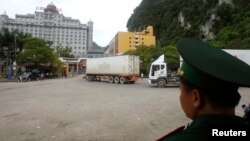Buy a water bottle or tube of lipstick in Vietnam and there’s a decent chance the packaging came from Duy Tan, a company that supplies plastic to other businesses. Dinh Dai Ky, a sales representative in Duy Tan’s exports division, said his company produces so much plastic that it’s running out of customers.
"The Vietnamese market is saturated, there’s no more room for us here," Ky said. "So we have to expand."
Duy Tan is eyeing new markets from Myanmar (also known as Burma) to Sweden, as well as preparing to expand its base in the United States.
"It has laws, it’s safe, so it’s good to do business in the U.S.," Ky said.
The government in Hanoi is hoping more businesses share Ky’s ambitions because they match Vietnam’s ambitions for itself. The country is working to grow its share of global trade, though not strictly for economic reasons.
"Integration" has become a buzzword of late among officials, who want to see Vietnam transformed into a respected player in the world community. Besides increasing trade, Vietnam has made a push to cooperate with as many nations as possible on the security, diplomatic and humanitarian fronts.
War, past and present
Interestingly, part of what’s driving this campaign is armed conflict, both in the past and potentially in the future.
Even though four decades have elapsed since the Vietnam War, this communist nation continues to be identified internationally as a former Cold War battlefield. Vietnam wants to reinvent itself and, to that end, integration is essential.
"It's telling the world, 'We're growing up. Look at us, we're not at war anymore, we're a country,' " said Dennis McCornac, an economist at Loyola University Maryland. He has advised officials in Vietnam on its transition from a socialist-oriented economy to one based on a free market.
The Vietnamese have become not only weary of war, but also wary that it could break out again in the South China Sea. Relations with China reached a new nadir this spring, when the bigger communist brother dispatched an oil rig to the waters that both countries claim as their own.
That pushed Vietnam onto the international arena, where it filed a petition with the United Nations to help settle the dispute multilaterally. McCornac argues that the provocation helped to speed up Vietnam’s already ongoing outreach to foreign friends.
"That’s sort of making it go a little bit faster," he said. "Vietnam has decided ... don't put all our eggs in one basket."
Increasing trade
Many Vietnamese worry there are already too many eggs in the Chinese basket. Vietnam has a trade deficit with China of $17.8 billion as of August, according to the General Statistics Office. Should clashes erupt at sea, they almost certainly would cause ripples hitting stock markets and pocketbooks.
That’s why the government is encouraging businesspeople like Ky to aim farther afield. Ky said he’ll benefit if the Trans-Pacific Partnership, a 12-nation trade deal that includes the U.S., gets signed. Negotiators are in Hanoi for the latest round of talks, just days after European Commission President Jose Manuel Barroso visited Vietnam to endorse a free trade agreement with the European Union.
"In terms of integration, Vietnam has never been so open before," Tran Tuan Anh, deputy minister of industry and trade, said at an August 21 workshop for exporting companies. "The fact that Vietnam is proactively organizing integration into markets like this is not just necessary, but crucial."
This summer, Vietnam has promoted greater ties with countries as diverse as India, Japan, Scotland and Sri Lanka. An especially important venue for Vietnam’s coming out is the Association of Southeast Asian Nations (ASEAN), which is planning an EU-style, tariff-free economic community to kick off in 2015. Le Luong Minh, a Vietnamese diplomat, is its secretary general.
Global player
By reinforcing ties with so many different parties, Vietnam is not only hedging against China, but also setting up a platform where it can prove itself. After decades of wartime fallout and economic devastation, Vietnam now looks to show it is no longer a victim reliant on development aid. It wants to be a contributing member of the club of civilized nations. Besides demonstrating leadership in ASEAN, Vietnam is amping up its involvement in global peacekeeping, including in South Sudan.
U.S. Gen. Martin Dempsey, chairman of the Joint Chiefs of Staff, said that topic arose when he met with officials in Hanoi.
"The Vietnamese government has taken a decision to begin to explore ways to participate in peacekeeping operations, and we had discussions about how we can help them do that," Dempsey told a gaggle of local and foreign reporters August 16 in Ho Chi Minh City. "I think that’s an important moment in the development of the Vietnamese military because it begins to give them that global view that I think will be very helpful to their development."
For Vietnam, the world's 14th most populous country, interest in global cooperation has also expanded to disaster and humanitarian aid, climate change and terrorism. Lewis Stern, former Southeast Asia director in the Office of the Secretary of Defense, believes that this is all part of a deliberate “road map” to improve integration by 2020. Stern wrote in a March 18 essay for the East-West Center that Vietnam’s strategy includes consultation with western analysts, conducting direct and earnest dialogues with foreigners, and training promising young military and foreign policy officials abroad.
As Stern wrote, “These young and well-educated officials represent an emergent human capital of mid-level foreign policy and defense/security bureaucrat with keen strategic talents and analytical acuity.”




